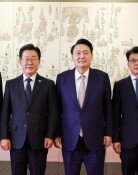N. Korean nuclear issue will not be resolved without resolute determination
N. Korean nuclear issue will not be resolved without resolute determination
Posted January. 23, 2016 07:08,
Updated January. 23, 2016 07:55
President Park Geun-hye on Friday called on her administration to "find various and creative approaches, including attempting to hold five-way talks excluding North Korea." At a policy briefing session for the Ministry Foreign Affairs, the Ministry of National Defense, and the Ministry of Unification, the president pointed out that the six-party talks had not been held for the past eight years. "Even if the talks are held again, questions on their effectiveness will be raised if they are not helpful in denuclearizing the North," she said.
The six-party talks started in August 2003 and later resulted in the shutdown of the North's Yongbyon nuclear facilities and produced the September 19, 2005 joint statement on beginning bilateral talks between North Korea and the United States. However, the six-nation forum has not made any further progress as the North continued its nuclear development in secret.
The idea of holding the six-party talks is nothing new. Chun Young-woo, a former South Korean chief negotiator for the talks, said, "There were talks of holding five-party talks, only to be opposed by China. It is hard for the five parties to gather together. Even if they do, it would be difficult for them to come up with an alternative beyond the U.N. Security Council's (UNSC) North Korea sanctions unless China changes its policy toward Pyongyang." At the current stage, it is more realistic to have the UNSC come up with sanctions that would make the North's Kim Jong Un feel really painful and concentrate their diplomatic resources on discussing measures each country should take in addition to the sanctions. If Beijing refuses to budge, Washington should be resolutely resolved to press China to join the sanctions through a "secondary boycott" of sanctioning individuals and companies making transactions with Pyongyang. In one sense, President Park's mention of five-nation talks is a call for Beijing's participation in the North Korea sanctions.
It is significant that President Park, at the policy briefing session, called for "approaching the North Korean nuclear issue from the dimension of resolving North Korea issues." She revealed her perception that the nuclear issue cannot be resolved without a regime change in the North. However, the three ministries' briefings failed to present any significant change from the existing measures. None of them proposed any concrete action plan or a new solution that would make the North give up its nuclear program. Kim Jong Un would never fear such measures and abandon the nuclear weapons development.
Without any progress in the North Korean nuclear issue, Seoul should forget about making any progress in the inter-Korean relations. More than anything else, firing the current chiefs of diplomacy and national security who failed to deter the North's nuclear development would clearly show Seoul's resolute determination. South Korea cannot get out of its national crisis caused by the North without becoming more resolved than Kim Jong Un to make Pyongyang give up its nuclear program and seek creative measures.
한기흥기자 eligius@donga.com







